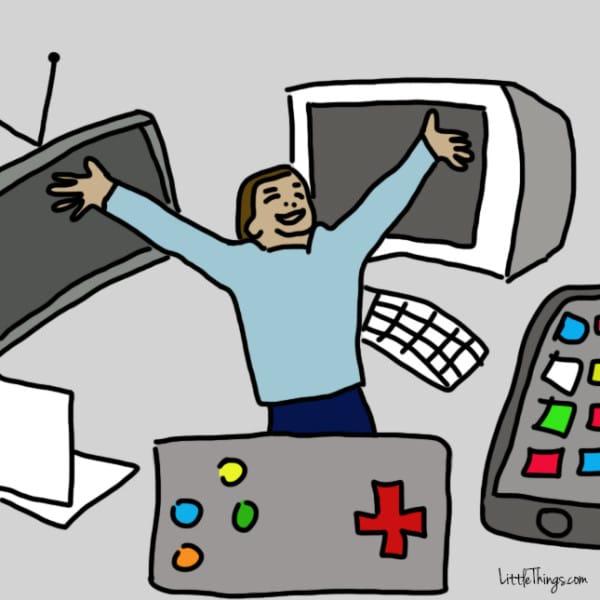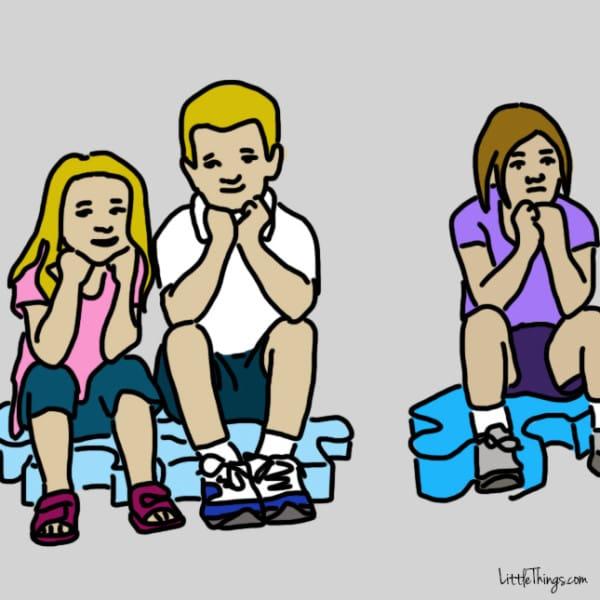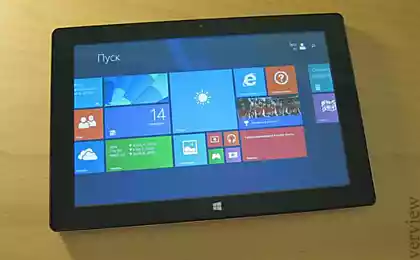Nowadays, children and teenagers all the polls have smart phones and tablet computers. And those who have not, are the parent device. In developed countries, the percentage of children regularly "sticky" to the plate, up to 90%! "We have already considered the norm allow a child to use technology in 2 years. At present, we can see that was a lot of 3-4-year-olds, which for them is literally addicted - says Fran Walvis, a children's therapist from Los Angeles. - This magnificently, and a little scared ».
Website brings 10 reasons to protect children from excessive use of tablets and smartphones.
1. It may change your attitude h2> 
In the period from zero to two years of a child's brain grows in size three times
But children spend in front of TV too much time with these things are not going well. "Neural pathways of children from early childhood addicted to technology, not developing as they should. As they get older, this leads to problems with concentration, self-esteem. When they grow up, it becomes difficult to build personal relationships "- the doctor said Denise Daniels.
2. Technologies are the first of their "drug» h2> 
"The most remarkable feature of technology - that in the virtual world, you can always do something new - and so on ad infinitum, - says Dr. Gary Small, a professor of psychiatry and director of the Center for longevity at the California Institute of Neurology. - That is why they are so difficult to give up their use ».
Smartphones and tablets allow kids get everything they want at the touch of the display. Technology does not teach them moderation and control impulses. The person gets used to the technology immediately, but, unlike you, the children have no experience in regard to self-restraint.
But they really need baby! < Website I wrote about the importance of self-control here.
3. Explosions tantrums h2> 
If the child has a relationship, then there is a tendency to roll up hysterics every time you take away their favorite toy. They become obsessed with, and therefore can be irritable at any age.
Giving your child a smartphone or tablet to calm him down, you take only a temporary respite, and exacerbate the problem at its very root. "If gadgets are the best way to appease and distract the child, how it will develop its own internal mechanisms of self-control?" - Asks Dr. Jenny Redeski.
4. They prevent them from sleeping h2> 
It's no secret that the use of smartphones, tablets or laptops bedtime hurting its quality. Light that is emitted screens, suppresses the production of a hormone called "melatonin" and thereby shifts the cycle of sleep and wakefulness.
"It has been proved that the use of electronic devices in the evening adversely affect the quality of sleep and our circadian rhythms," - explains neurologist Anne-Marie Chan.
5. This affects their ability to learn. H2> 
According to researchers, smartphones harm a child's ability to learn, because it is constantly distracting them scatter their attention.
"These devices also replace free thought process. This is when the child comprehends what is happening in his life. The absence or lack of such experience reduces the rate of development of sensory-motor and visual-motor skills. And they are important for learning - especially for mathematics and physics, "- adds Dr. Jenny Redeski from Boston University.
6. It deprives him of the possibility to think about the consequences of his actions h2> 
If you are constantly communicating online, it is unlikely to be able to establish with the person a strong social bond. You do not feel his intonation, the changes do not hear his voice, do not watch unconsciously his body language and the expression on his face. And you do not get access to his pheromones.
"That's all - the basis for the establishment of human relationships. But the messengers do not give any of it - says psychologist Jim Taylor. - Children spend too much time to communicate on the Internet, but do not develop their speaking skills at the same time. Communication is established only in words, but not on an emotional level ».
7. This increases the likelihood of developing mental disorders h2>
When all online, and when all humiliate one another in public, rather than in person, very easy to go crazy. At the phenomenon has even appeared term - "cyber-bullying". On the Internet there are thousands of forums where teenagers are humiliated because they are something different from the rest.
Experts say that a large amount of time that children are paying gadgets, is a risk factor for the development of childhood depression, anxiety, lack of attachment to the parents, attention deficit disorder, psychosis and other behavioral problems.
8. This can lead to obesity h2> 
To get online, do not move. On the contrary, this is best done sitting on a chair or lying on the couch. You can get stuck, and for several hours almost not moving. Of course, this contributes to weight gain.
According to one study, children who are allowed to go online from their bedroom, 30% more likely to suffer from obesity.
When a child becomes thick, he has a lot of other problems. His classmates are beginning to offend, and because of this it is even more focused on virtual reality. It is a vicious circle.
9. This makes them aggressive h2> 
Today's children are less capable of empathy. Especially those whose parents did not regulate their relations with the devices. These children comfortable in the online world, which kill many more children - is normal.
There is a huge amount of violent videogames, which may desensitize children to violence.
As a result, some children start to think that aggressive behavior - this is a normal way of competition and address.
10. Technology provoke social anxiety h2> 
The development of social skills is critical to the overall success of the child. If the children are too nervous because of their interaction with others, it can hinder their ability to get better.
The child must live constantly communicate with your family, with other children their age. He must learn to read facial expressions and body language. I must learn to show compassion and know how to behave at ease in the company of others when he grows up.
«< children, like all of us, need to communicate face to face, - concludes Daniels. - If they do not learn to express themselves and their emotions without technology, is seriously restrict themselves ».
via lifter.com.ua/post/1770

































